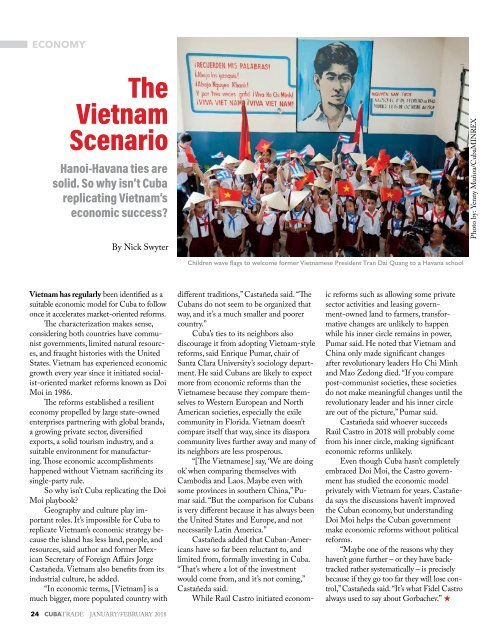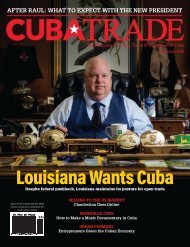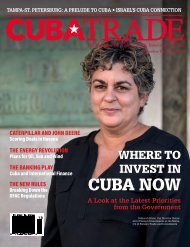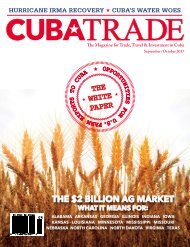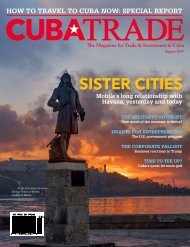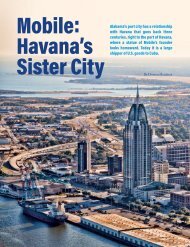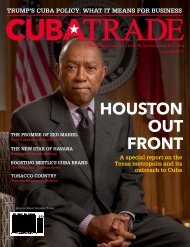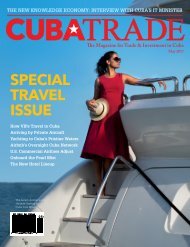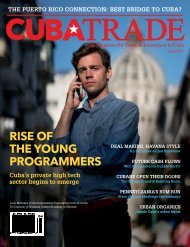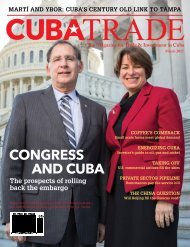Create successful ePaper yourself
Turn your PDF publications into a flip-book with our unique Google optimized e-Paper software.
ECONOMY<br />
The<br />
Vietnam<br />
Scenario<br />
Hanoi-Havana ties are<br />
solid. So why isn’t Cuba<br />
replicating Vietnam’s<br />
economic success?<br />
By Nick Swyter<br />
Photo by: Yenny Muñoa/CubaMINREX<br />
How do we move food<br />
from Hastings to Havana?<br />
Break down barriers.<br />
Children wave flags to welcome former Vietnamese President Tran Dai Quang to a Havana school<br />
Vietnam has regularly been identified as a<br />
suitable economic model for Cuba to follow<br />
once it accelerates market-oriented reforms.<br />
The characterization makes sense,<br />
considering both countries have communist<br />
governments, limited natural resources,<br />
and fraught histories with the United<br />
States. Vietnam has experienced economic<br />
growth every year since it initiated socialist-oriented<br />
market reforms known as Doi<br />
Moi in 1986.<br />
The reforms established a resilient<br />
economy propelled by large state-owned<br />
enterprises partnering with global brands,<br />
a growing private sector, diversified<br />
exports, a solid tourism industry, and a<br />
suitable environment for manufacturing.<br />
Those economic accomplishments<br />
happened without Vietnam sacrificing its<br />
single-party rule.<br />
So why isn’t Cuba replicating the Doi<br />
Moi playbook?<br />
Geography and culture play important<br />
roles. It’s impossible for Cuba to<br />
replicate Vietnam’s economic strategy because<br />
the island has less land, people, and<br />
resources, said author and former Mexican<br />
Secretary of Foreign Affairs Jorge<br />
Castañeda. Vietnam also benefits from its<br />
industrial culture, he added.<br />
“In economic terms, [Vietnam] is a<br />
much bigger, more populated country with<br />
24 CUBATRADE JANUARY/FEBRUARY 2018<br />
different traditions,” Castañeda said. “The<br />
Cubans do not seem to be organized that<br />
way, and it’s a much smaller and poorer<br />
country.”<br />
Cuba’s ties to its neighbors also<br />
discourage it from adopting Vietnam-style<br />
reforms, said Enrique Pumar, chair of<br />
Santa Clara University’s sociology department.<br />
He said Cubans are likely to expect<br />
more from economic reforms than the<br />
Vietnamese because they compare themselves<br />
to Western European and North<br />
American societies, especially the exile<br />
community in Florida. Vietnam doesn’t<br />
compare itself that way, since its diaspora<br />
community lives further away and many of<br />
its neighbors are less prosperous.<br />
“[The Vietnamese] say, ‘We are doing<br />
ok’ when comparing themselves with<br />
Cambodia and Laos. Maybe even with<br />
some provinces in southern China,” Pumar<br />
said. “But the comparison for Cubans<br />
is very different because it has always been<br />
the United States and Europe, and not<br />
necessarily Latin America.”<br />
Castañeda added that Cuban-Americans<br />
have so far been reluctant to, and<br />
limited from, formally investing in Cuba.<br />
“That’s where a lot of the investment<br />
would come from, and it’s not coming,”<br />
Castañeda said.<br />
While Raúl Castro initiated economic<br />
reforms such as allowing some private<br />
sector activities and leasing government-owned<br />
land to farmers, transformative<br />
changes are unlikely to happen<br />
while his inner circle remains in power,<br />
Pumar said. He noted that Vietnam and<br />
China only made significant changes<br />
after revolutionary leaders Ho Chi Minh<br />
and Mao Zedong died. “If you compare<br />
post-communist societies, these societies<br />
do not make meaningful changes until the<br />
revolutionary leader and his inner circle<br />
are out of the picture,” Pumar said.<br />
Castañeda said whoever succeeds<br />
Raúl Castro in 2018 will probably come<br />
from his inner circle, making significant<br />
economic reforms unlikely.<br />
Even though Cuba hasn’t completely<br />
embraced Doi Moi, the Castro government<br />
has studied the economic model<br />
privately with Vietnam for years. Castañeda<br />
says the discussions haven’t improved<br />
the Cuban economy, but understanding<br />
Doi Moi helps the Cuban government<br />
make economic reforms without political<br />
reforms.<br />
“Maybe one of the reasons why they<br />
haven’t gone further – or they have backtracked<br />
rather systematically – is precisely<br />
because if they go too far they will lose control,”<br />
Castañeda said. “It’s what Fidel Castro<br />
always used to say about Gorbachev.” H<br />
Cargill is committed to helping the world thrive.<br />
© 2016 Cargill, Incorporated<br />
When America farmers are able to freely<br />
export their crops to other countries, it<br />
nourishes the people who need them<br />
most. Opening new markets for US<br />
agriculture boosts food production, spurs<br />
job creation and puts food on more tables<br />
across the globe. That’s why we champion<br />
open trade flows – to raise incomes for<br />
all and build local economies that thrive.<br />
Learn more at cargill.com/food-security.


